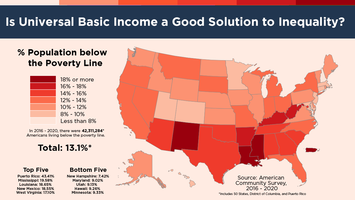
‘Capitalists will sell us the rope with which we will hang them.’ This colourful quote, sometimes attributed to Lenin, could well apply to the many free-market ideologues and tech oligarchs in the US, who are now pushing for increased welfare payouts and even a universal basic income (UBI). Through the expansion of welfarism at the expense of work, these capitalists could well be hastening the decline of the very economic system they profess to support.
Even devoted free-market advocates, like former senator Phil Gramm and economist John Early, now argue that increased welfare payouts, or ‘income transfer payments’, should be championed to reduce inequality in the US.
The welfarist solution may reduce income inequality on paper. But it does nothing to address the far more pernicious problems caused by the rapid concentration of assets in ever fewer hands. The top one per cent in the US has increased its share of assets by roughly 26 per cent since 2002.
There are further consequences to the expansion of welfare and the devaluation of work. It changes people’s character. The income you earn is empowering, whereas the dole nurtures dependence. Increasingly, the aspirational side of capitalism is being squelched by the rollout of ever more benefits.
Supporters of welfarism can point to the experience of Covid-19, when emergency pandemic aid cut poverty substantially in the US. But the Covid subsidy regime has not been a rollicking success for most. Indeed, for the past year, wages have grown, but not nearly as much as inflation.
One widely cited reason for the recent labour shortages relates to a post-pandemic reluctance to take low wages, or jobs in the ‘gig’ economy, where pay and hours are often uncertain. Indeed, according to one UK account, self-employment and gig work do not provide sustenance for anything like a middle-class lifestyle. Many jobs that could support families have disappeared, and so too has the motivation to work.
Under such conditions, what Karl Marx called the ‘reserve army of the unemployed’ is simply disengaging from the economy. Male labour-participation rates have fallen from over 80 per cent in 1950 to 68 per cent today. Almost one-third of American working-age males are not in the labour force, and are suffering from high rates of incarceration, drug, alcohol and other health issues.
This withdrawal from the labour force is happening amid a demographic downturn in the high-income world. The proportion of the US population aged between 16 and 64 grew by 21 per cent during the 1980s. During the 2010s, it grew by less than five per cent. The EU and East Asia are suffering even stronger declines in their working-age populations.
Read the rest of this piece at Spiked.
Joel Kotkin is the author of The Coming of Neo-Feudalism: A Warning to the Global Middle Class. He is the Roger Hobbs Presidential Fellow in Urban Futures at Chapman University and Executive Director for Urban Reform Institute. Learn more at joelkotkin.com and follow him on Twitter @joelkotkin.
Photo: Chart developed using data from ACS poverty statistics, via Wikimedia under CC by SA 4.0 License.












